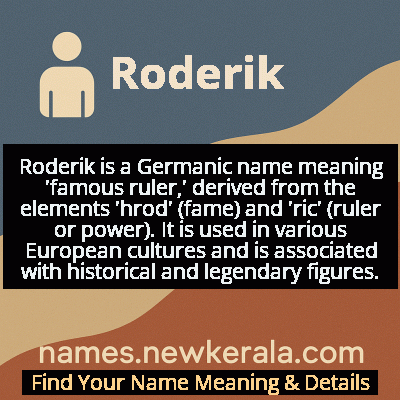Roderik Name Meaning & Details
Origin, Popularity, Numerology Analysis & Name Meaning of Roderik
Discover the origin, meaning, and cultural significance of the name RODERIK. Delve into its historical roots and explore the lasting impact it has had on communities and traditions.
Name
Roderik
Gender
Male
Origin
Christian
Lucky Number
8
Meaning of the Name - Roderik
Roderik is a Germanic name meaning 'famous ruler,' derived from the elements 'hrod' (fame) and 'ric' (ruler or power). It is used in various European cultures and is associated with historical and legendary figures.
Roderik - Complete Numerology Analysis
Your Numerology Number
Based on Pythagorean Numerology System
Ruling Planet
Saturn
Positive Nature
Ambitious, efficient, realistic, and authoritative.
Negative Traits
Materialistic, stressed, confrontational, and can be overly ambitious.
Lucky Colours
Dark blue, black.
Lucky Days
Saturday.
Lucky Stones
Blue sapphire, amethyst.
Harmony Numbers
2, 4, 6.
Best Suited Professions
Business leaders, managers, financial services, law enforcement.
What People Like About You
Leadership, determination, organizational skills.
Famous People Named Roderik
Roderik of Córdoba
Christian Martyr
Executed for defending Christianity during Muslim rule in 9th century Spain
Roderik O'Flaherty
Historian
Wrote 'Ogygia', pioneering work on Irish history in the 17th century
Roderik Murchison
Geologist
Established the Silurian geological system and led Royal Geographical Society
Roderik MacKinnon
Scientist
Nobel Prize in Chemistry for ion channel research
Name Variations & International Equivalents
Click on blue names to explore their detailed meanings. Gray names with will be available soon.
Cultural & Historical Significance
Extended Personality Analysis
Individuals named Roderik are typically characterized by a compelling blend of leadership qualities, intellectual depth, and strong personal integrity. The name's meaning of 'famous ruler' often manifests in natural authority and organizational abilities, with Roderiks frequently finding themselves in positions of responsibility. They tend to be strategic thinkers who approach challenges with careful analysis rather than impulsive action, making them effective problem-solvers in complex situations. Their leadership style is often described as principled and thoughtful, combining ambition with a strong sense of ethics. Roderiks typically value tradition and stability, yet they're not afraid to innovate when circumstances demand change. They often possess a dry, intelligent wit and can be excellent conversationalists on topics that interest them. In personal relationships, Roderiks are known for their loyalty and reliability, though they may take time to open up to new people. They tend to form deep, lasting connections rather than numerous superficial relationships. Their combination of analytical thinking and emotional depth makes them excellent confidants and advisors. While they can be perceived as reserved or serious initially, those who earn their trust discover individuals of considerable warmth, wisdom, and unexpected humor beneath the composed exterior.
Modern Usage & Popularity
In contemporary naming practices, Roderik occupies an interesting position as a classic name that has avoided both extreme popularity and complete obscurity. While it's no longer common in English-speaking countries (ranking outside the top 1000 in the US and UK), it maintains steady usage in Germanic and Scandinavian regions where the 'k' spelling is preferred. Modern parents who choose Roderik typically seek a name with historical weight and distinctive character, often valuing its noble connotations and literary associations. The name appeals particularly to educated families interested in European history, literature, or those with Germanic heritage. Recent naming trends show a slight increase in traditional names with strong consonant sounds, which may benefit Roderik's usage. However, it remains firmly in the 'uncommon but recognizable' category—familiar enough that most people can pronounce and spell it, yet distinctive enough to stand out. The name's variations, particularly Rodrigo in Spanish-speaking countries and Roderick in English contexts, see more frequent use, suggesting that while the core name elements remain appealing, spelling preferences vary significantly by culture and language background.
Symbolic & Spiritual Meanings
Symbolically, Roderik represents the intersection of leadership, heritage, and moral fortitude. The name embodies the concept of 'noble power'—authority exercised with wisdom, responsibility, and ethical consideration. In metaphorical terms, Roderik symbolizes the bridge between tradition and progress, honoring historical legacy while embracing necessary evolution. The name's Germanic roots connect it to ancient concepts of honor-based leadership, where rulers earned respect through wisdom and fairness rather than mere force. Psychologically, Roderik suggests depth, resilience, and the capacity to bear significant responsibility without being overwhelmed by it. The name's Christian associations add layers of spiritual symbolism, representing faith tested through adversity and the courage to stand by one's convictions. In literary and cultural contexts, characters named Roderik often serve as symbols of inheritance—both the blessings and burdens of family legacy, historical tradition, and cultural continuity. The name also carries subtle echoes of romanticism and tragedy through its association with historical figures like the last Visigothic king, adding dimensions of fate, destiny, and the poignant beauty of noble failure. Ultimately, Roderik symbolizes the enduring human quest for meaningful leadership and the preservation of values across generations.

